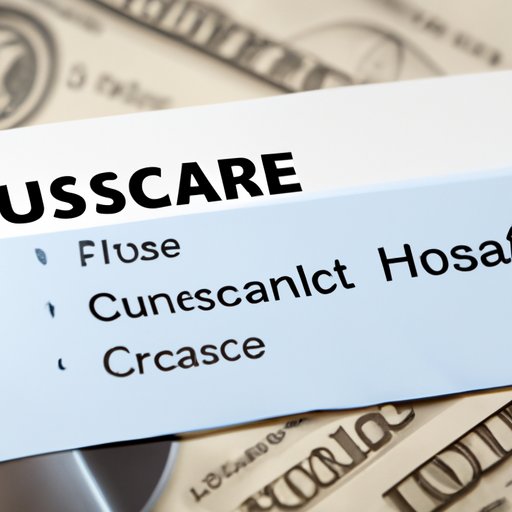Introduction
Universal health care is a system of government-funded health care that provides free or low-cost access to medical services for all citizens. In the United States, the current health care system is largely privatized and relies on employer-sponsored health insurance and out-of-pocket payments for services. This system has been criticized for leaving many uninsured or underinsured and creating a large financial burden for those who do have health insurance. As a result, there has been an increased interest in establishing a universal health care system in the United States.
Analyzing the Cost of Universal Health Care in the U.S.
Estimating the financial burden of providing universal health care is difficult because it depends on the design of the system and how it is funded. Generally, a universal health care system would require additional taxes to cover the cost of providing health care to all citizens. For example, some countries fund their universal health care systems through payroll taxes, while others rely on income taxes or a combination of both.
In addition to taxes, the cost of establishing a universal health care system in the United States would depend on the types of services covered and the level of coverage. Some services, such as emergency care, are typically covered by most health care systems, while others, such as dental care or long-term care, may not be included. The number of providers available and the amount they are paid for their services will also affect the cost of universal health care.
Another factor to consider is the price tag associated with making health care accessible to all citizens. This includes the cost of setting up and maintaining the infrastructure needed to provide health care services, such as hospitals, clinics, and pharmacies. Additionally, there may be costs associated with training and hiring more health care professionals and expanding access to health care services in rural and underserved areas.

Forecasting the Impact of Establishing Universal Health Care
Exploring the potential costs of implementing universal health care is necessary to determine whether it is feasible. According to some estimates, the cost of providing universal health care in the United States could range from $1.8 trillion to $3.5 trillion annually. This would represent a significant increase in spending relative to the current system, which costs approximately $3.6 trillion per year.
It is important to note that the cost of establishing universal health care in the United States is likely to vary depending on the design of the system and the sources of funding. For example, a system that covers fewer services or pays providers less than they currently receive could reduce the cost significantly. Additionally, if the system is funded through taxes, the cost could be reduced by introducing measures to make the tax system more progressive.
When comparing the cost of universal health care in the United States to other countries, it is important to look at total health care spending as a percentage of GDP. In 2018, the United States spent 17.2% of its GDP on health care, compared to 11.5% in Canada and 9.7% in the United Kingdom. This suggests that the cost of establishing a universal health care system in the United States could be lower than in other countries if designed and funded appropriately.
Conclusion
In conclusion, the cost of establishing a universal health care system in the United States is difficult to estimate due to the complexity of the system and its potential sources of funding. However, it is possible to forecast the potential impact of such a system by looking at the cost of providing health care in other countries, as well as the potential savings associated with a more efficient system. Overall, it appears that the cost of providing universal health care in the United States could be lower than in other countries if designed and funded appropriately.
Ultimately, the decision to establish a universal health care system in the United States should be based on a thorough analysis of the potential costs and benefits. Such an analysis should consider the impact on individuals, businesses, and the overall economy. Additionally, policymakers should examine the implications of shifting from a private system to a public system, as well as the potential for increasing access to health care services in rural and underserved areas.
The debate over the cost of establishing a universal health care system in the United States will undoubtedly continue in the years to come. In the meantime, it is important to remember that the goal of providing quality, affordable health care to all citizens is a worthy one, and one that should be pursued regardless of the cost.
(Note: Is this article not meeting your expectations? Do you have knowledge or insights to share? Unlock new opportunities and expand your reach by joining our authors team. Click Registration to join us and share your expertise with our readers.)
